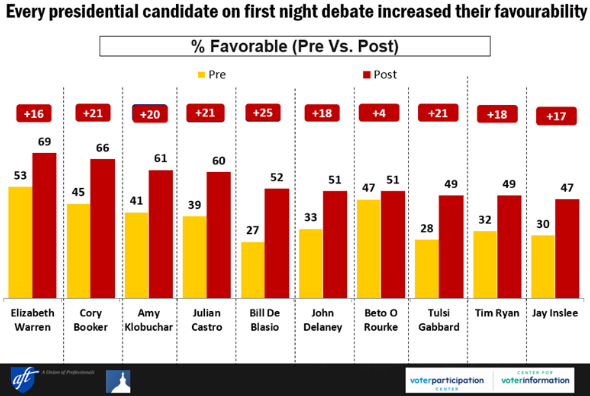According to an Pew Research Center opinion survey of 10,170 respondents, including 5,675 Democrats and Democratic leaners, “Nearly Half of Democrats Say the Best Age for a President Is ‘In Their 50s’.”
Drilling down, the survey, which was conducted April 29-May 13, 2019, also found:
When asked about the ideal age for a president, most Democrats say they prefer someone in their 40s through their 60s, with nearly half (47%) saying the best age for a president is “in their 50s.”…Two of the Democratic Party’s best-known candidates, Joe Biden and Bernie Sanders, are in their 70s, yet only 3% of Democrats and Democratic-leaning independents say this is the best age range for a president. And just 6% say it would be ideal for a president to be in their 30s.
Breaking the data down by age of poll respondents:
The survey also finds that, in general, younger Democrats are more likely than older Democrats to prefer that a president be in their 30s or 40s. A majority of Democrats ages 18 to 29 (55%) say it is best for a president to be in their 30s (13%) or 40s (42%). Among Democrats in their 30s, 40% say it is best for a president to be in their 30s or 40s, while 30% of those in their 40s say this. But among Democrats 50 and older, 12% view these as the ideal ages for a president.
For Democrats – apart from those 18 to 29 –the preferred age for a president is in the 50s. Although Democrats who are 70 and older are more likely than those in other age groups to say it is best for a president to be in their 60s (33% say this), nearly half (47%) say the 50s is the ideal age. Among Democrats 70 and older, just 4% say it is best that a president be in their 70s.
So which Democratic candidates might benefit by these findings? Back in February, The National Review’s Jim Geraghty put together a feature entitled “The Age of Democratic Presidential Candidates,” which provides the ages of most of today’s candidates on election day:
Vermont senator Bernie Sanders: 79 years, 1 month, 26 days.
Former New York City mayor Mike Bloomberg: 78 years, 8 months, 20 days.
Massachusetts senator Elizabeth Warren: 71 years, 4 months, 12 days.
Former attorney general Eric Holder: 69 years, 9 months, 9 days.
Washington governor Jay Inslee: 69 years, 8 months, 25 days.
Former Colorado governor John Hickenlooper: 68 years, 8 months, 27 days.
Ohio senator Sherrod Brown: 67 years, 11 months, 25 days.
Potential independent candidate and former Starbucks CEO Howard Schulz: 67 years, 3 months, 29 days.
Former Virginia governor Terry McAuliffe: 63 years, 8 months, 25 days.
Minnesota senator Amy Klobuchar: 60 years, 5 months, 9 days.
New York City mayor and notorious groundhog killer Bill de Blasio: 59 years, 5 months, 26 days.
Maryland congressman John Delaney, who really exists: 57 years, 6 months, 18 days.
California senator Kamala Harris: 56 years, 14 days.
New Jersey senator Cory Booker: 51 years, 6 months, 8 days.
Former mayor and HUD secretary Julian Castro: 46 years, 1 month, 20 days.
Hawaii congresswoman Tulsi Gabbard: 39 years, 6 months, 22 days.
South Bend mayor Pete Buttigieg: 38 years, 9 months, 15 days.
Scratch non-starters Bloomberg, Schultz, Brown, McAuliffe and Holder from the list, and add Eric Swallwell (38), Marianne Williamson (67), Steve Bullock (54), Seth Moulton (40), Tim Ryan (47), Andrew Yang (45) and Michael Bennet (45), each of whom will be a year older on election day.
“To get a sense of the generational difference,” Geraghty adds, “when Joe Biden was first elected to the Senate, Buttigieg, Gabbard, and Castro had not been born yet and O’Rourke was two months old.” At least we can credit Democrats with decent age diversity. But yes, let’s remember that Sen. Sanders got more support from young voters, than Trump and Clinton combined, though his support from younger voters slipped in a recent Morning Consult poll.
If the Pew survey findings hold even roughly, Democrats may have a problem if the front-runners in the primaries are in their seventies. For one thing, having an older presidential nominee also makes the selection of the vice presidential candidate more strategically-important than usual.
I like Biden, Bernie and Warren, and I believe all three would make excellent presidents. And let’s remember that mature judgement and experience can be a critical asset for a president, despite Rep. Swalwell’s “pass the torch” debate mantra. Age can provide strengths, as well as weaknesses. But that much-disparaged concept, “electability” can’t be easilly dismissed, even though nobody seems to be able to define it.
Thinking ahead, however, I’m less concerned about election day 2020, than the first Tuesday of November 2024, when two of the current leading Democratic presidential candidates will be in their 80s. That re-elect could be a tough sell for Dems, particularly if the Republicans field a young, energetic candidate.
Of course, chronological age doesn’t necessarily measure physical or mental health. But it wouldn’t be a bad thing for Democratic voters to think a bit about 2024 in making their choices. Democrats are in good positon to win the white house and congressional majorities for the forseeable future. Giving more thought to an 8-year strategy can’t hurt.




